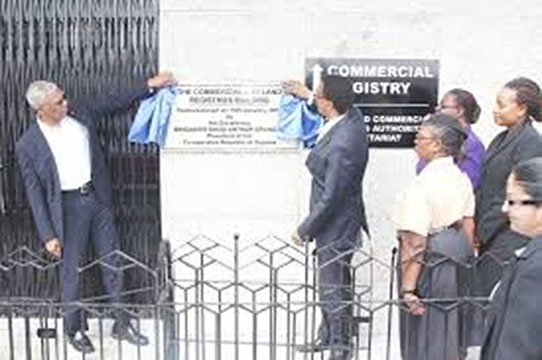Given the deadly coronavirus pandemic and measures including stay-at-home orders to stem its spread, the Commercial Registry has announced an extension of its closure, which has prevented the completion of many transactions, including the registration of bills-of-sale.
Initial COVID-19 Emergency Measures published in the Official Gazette of April 29th, 2020 had provided for closure of all non-essential businesses until May 3rd.
But with the increasing rise in the number of persons contracting the disease, however, the National COVID-19 Task Force announced that by direction of the President in accordance with the Public Health Ordinance, the extension of closures to June 3rd.
However, with, the closure of registries, such as the Commercial and Deeds Registries, which provide pivotal services, there are resulting hardships for many who are unable to get certain transactions done.
Against this background one attorney in an invited comment told Stabroek News that perhaps what can be considered is having these registries open, but with stringent social distancing measures to curb the spread of the virus as other essential services are mandated to practice.
Attorney-at-law Kamal Ramkarran has posited that since the services of lawyers as well as commercial banks have been deemed essential, and since these registries provide services which are in turn essential both to banks and attorneys, “some sort of measure could have been put in place for electronic filing of the documents needed to be filed in those registries.”
He said that the closure of the Deeds and Commercial Registries, which may be further extended, has serious consequences on the business community, the legal community, the banking community and on ordinary people who simply need to get important business concluded.
He added that as far as he is aware, because of the closure of those registries, no powers-of-attorney can be registered, no companies can be incorporated, no mortgages can be filed, and no bills-of-sale can be registered.
“No searches can be conducted in those registries,” Ramkarran said.
He referenced two cases where he said the closure of the registries have significantly hampered the otherwise smooth completion of business.
The lawyer said he knows of someone who has sold their house and is waiting for their mortgage to pay off for the new house they bought.
Ramkarran explained the because of the closure of the Deeds Registry, however, that individual cannot move into their new house and neither can they move out of the old house and has no idea when they will be able to do so.
He noted that the vendor and the buyer are just waiting.
He said that in another case, a person bought a car but cannot pay for it until they get a loan. He explained that that person cannot get the funds to pay for the car because the bill of sale on the car cannot be registered, so they will have to wait and take what measures they can to find their way to essential services when necessary.
Ramkarran surmised that it may well be that in both cases the underlying transactions are eventually terminated because the vendors can no longer wait, so in addition to just causing anxiety and delay, there may be more serious consequences owing to the closure of the registries.
Because of these circumstances, Ramkarran is urging that these registries, which provide services essential to what lawyers and commercial banks provide, should be allowed to open, but in adherence to all protocols aimed at flattening the coronavirus curve.
The set principles and guidelines set out by the World Health Organization (WHO) in an effort to contain the spread to the coronavirus include social distancing and stay-at-home orders for non-essential workers, which allows for persons to work remotely from their homes where possible, among others.
The Commercial and Deeds Registries are not listed in the essential-worker category.






